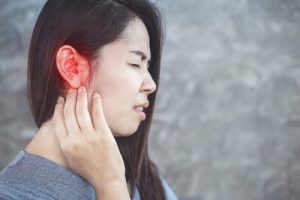
Outer ear infections, also known as otitis externa or “swimmer’s ear,” are a common condition that can cause pain, itching and discomfort in the ear canal. These infections are often preventable with proper ear care. Here’s a comprehensive guide to help you take care of your ears and avoid outer ear infections.
Understanding Outer Ear Infections
Outer ear infections occur when bacteria or fungi invade the skin lining the ear canal, often following water exposure or injury. Symptoms include ear pain, itching, redness, swelling and sometimes discharge. In severe cases, it can lead to temporary hearing loss.
Symptoms of Outer Ear Infection
Outer ear infections otitis externa, commonly present with several symptoms that can vary in intensity. The most frequent signs include:
● Ear Pain: Often the first and most noticeable symptom, which may worsen when pulling on the outer ear or chewing.
● Itching: A persistent itch inside the ear canal.
● Redness and Swelling: The skin around the ear canal may appear red and swollen.
● Discharge: A clear, yellowish or pus-like fluid may drain from the affected ear.
● Temporary Hearing Loss: A feeling of fullness in the ear or decreased hearing on the affected side.
● Tenderness: The outer ear and surrounding area may be tender to the touch.
If you experience these symptoms, it’s important to seek medical attention for proper diagnosis and treatment.
Outer Ear Infections Preventive Measures
Preventive measures for ear wax infection can help maintain ear health and prevent discomfort. Ear wax is a natural substance produced by glands in the ear canal to protect the ear from dust, foreign particles and microorganisms. However, excessive buildup of ear wax can lead to blockages and infections. Here are some preventive measures to avoid ear wax infection:
Keep Your Ears Dry
Water can carry bacteria into the ear canal, so it’s essential to keep your ears dry. After swimming or showering, gently dry your ears with a towel or use a hairdryer on a low setting. Avoid inserting objects into the ear canal, as this can cause injury and make the ear more susceptible to infection.
Use Ear Plugs
If you swim frequently or are prone to ear infections, consider wearing earplugs or a swimming cap to keep water out of your ears.
Avoid Over-Cleaning
While it’s important to keep your ears clean, over-cleaning can remove the protective layer of earwax, leading to dryness and irritation. Use a damp cloth to clean the outer part of your ears and avoid inserting cotton swabs or other objects into the ear canal.
Protect Your Ears from Injury
Be careful when using cotton swabs, hairpins or other objects to clean your ears. These can scratch the skin and create an entry point for bacteria. Also, avoid using ear candles, as they can cause burns and ear injuries.
Manage Skin Conditions
Conditions like eczema or psoriasis can make the skin in the ear canal more vulnerable to infection. If you have a skin condition that affects your ears, follow your doctor’s recommendations for managing it.
Use Ear Drops Wisely
If you’re prone to outer ear infections, your doctor may recommend using preventive ear drops, especially after swimming. However, avoid using ear drops if you have a perforated eardrum and consult your doctor before using any over-the-counter ear products.
Watch for Signs of Infection
Be vigilant for symptoms of an outer ear infection, such as ear pain, itching, redness or discharge. If you notice any of these signs, seek medical advice promptly.
Maintain Good Hygiene
Regularly clean items that come into contact with your ears, such as earbuds or hearing aids, to reduce the risk of transferring bacteria to your ear canal.
Stay Healthy
A healthy immune system can help prevent infections, including those in the ear. Eat a balanced diet, get regular exercise and ensure you’re up-to-date on vaccinations.
Treatment of Outer Ear Infections
If you do develop an outer ear infection, it’s important to seek treatment to prevent complications and relieve symptoms. Outer ear infection treatment typically involves:
● Cleaning: A healthcare professional may clean your ear canal to remove debris and discharge, allowing the medication to reach the infected area effectively.
● Ear Drops: Antibiotic or antifungal ear drops are commonly prescribed to treat the infection. These may also contain steroids to reduce inflammation and pain.
● Pain Management: Over-the-counter pain relievers like ibuprofen or acetaminophen can help alleviate pain associated with the infection.
● Avoiding Water: Keep your ear dry while the infection heals. Avoid swimming and protect your ears during showers and baths.
In severe cases or if the infection does not respond to standard treatments, oral antibiotics or antifungals may be necessary. Follow our healthcare provider’s instructions carefully and complete the full course of treatment.
Find Relief for Ear Infections at Aroga Pharmacy!
Taking care of your ears is important to avoiding outer ear infections. By keeping your ears dry, avoiding over-cleaning, protecting them from injury and managing skin conditions, you can significantly reduce your risk of developing an infection. If you do experience symptoms of an outer ear infection, seek medical attention promptly to prevent complications and ensure a speedy recovery
Are you experiencing symptoms of an ear infection? Don’t let discomfort and pain disrupt your daily life. At Aroga Pharmacy, we offer expert ear infection treatment in Farnham Common and Farnham Royal. Our experienced pharmacists are here to provide you with the care and medication you need for a speedy recovery.
